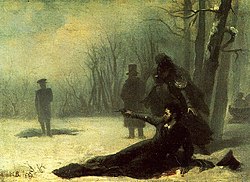The following is a list of last words uttered by notable individuals during the 19th century (1801-1900). A typical entry will report information in the following order:
Contents
- 1801–1809
- 1810–1819
- 1820–1829
- 1830–1839
- 1840–1849
- 1850–1859
- 1860–1869
- 1870–1879
- 1880–1889
- 1890–1900
- Notes
- References
- External links
- Last word(s), name and short description, date of death, circumstances around their death (if applicable), and a reference.





























